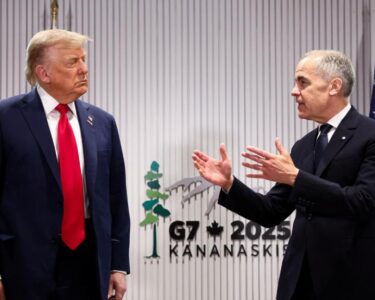U.S. President Donald Trump announced last night via his social media platform that a ceasefire had been achieved between Israel and Iran, promising an end to what he called the “12-day war”. The announcement surprised the world as the Israeli Air Force continues to conduct extensive strikes in Tehran and across Iran, while Iran presents a contradictory position, on one hand denying a formal agreement and on the other signaling its intention to stop responses if Israel halts its attacks.
In a dramatic tweet published at night, Trump wrote: “I am happy to congratulate the courage and wisdom to end the ’12-day war'”. According to him, a graduated framework was achieved whereby, if everything “goes well”, an official declaration ending the war with Iran is expected to be received on Wednesday around 7:00 AM. Trump added: “This will last forever. A wonderful day for the world”.
Following the announcement, it emerged that behind the scenes a complex diplomatic process had been conducted through Qatar’s mediation. An official Reuters source revealed that Trump spoke with the Emir of Qatar and told him that Israel had agreed to the proposal, while Qatari Prime Minister Mohammed bin Abdulrahman Al-Thani in turn secured Iran’s agreement. White House sources confirmed that Prime Minister Netanyahu approved the proposal in a conversation with Trump, with the central condition being the cessation of attacks by Iran.
The official Iranian response came in the early morning hours from Foreign Minister Abbas Araghchi, who explicitly denied the existence of a formal agreement. “As of now, there is no agreement, ceasefire, or halt to military operations”, Araghchi wrote on social media. However, in the continuation of his statement he left a significant opening: “If the Israeli regime stops its aggression against the Iranian people no later than 4:00 Tehran time, we have no intention to continue our response”. Araghchi added that “the final decision on stopping our operations will be made later”. It should be noted that the tweet was published after 4:00 in Iran, raising questions about the practical meaning of the ultimatum.
In support of the president’s announcement, a senior Iranian official confirmed in a conversation with foreign media that Tehran had indeed agreed to the proposal, though he did not detail its exact conditions. The apparent contradiction between the minister’s and the official’s statements indicates internal disagreements in Iran’s decision-making mechanism.
Parallel to the diplomatic announcements, the military reality continues to be turbulent. The Israeli Air Force conducted “heavy strikes” at noon on dozens of targets across Iran, with more than 50 fighter jets participating in the operation. The main focus was the extensive attack on Tehran, which included hitting Revolutionary Guard headquarters and strategic infrastructure. Among the prominent targets was also the entrance to the notorious “Evin” prison, where Iranian regime opponents are held.
An IDF spokesperson detailed that the wave of attacks targeted missile production sites, radars, and missile storage infrastructure in the Tehran area. The strikes are being carried out against the backdrop of Israeli preparations for possible barrages, with security forces at maximum alert level.
In Jerusalem, the narrow security cabinet convened in a bunker for an emergency discussion. Prime Minister Netanyahu instructed ministers not to comment on the matter until discussions were completed. Sources in the Prime Minister’s Office refrained from any official reference to Trump’s announcement, emphasizing that Israel would continue to act according to its security considerations.
In Washington, the American Vice President defined the “12-day war” as “an important reset for the entire region”, emphasizing the strategic importance of the ceasefire agreement. U.S. Ambassador to Israel Mike Huckabee welcomed the announcement in an emotional post, writing: “It’s 3:00 AM in Israel, and I woke up to a phone call instead of a ballistic missile. President Trump announced wonderful news to the world about a ceasefire that will soon take effect – these 12 days felt like 12 years. The President didn’t just ‘pray for the peace of Jerusalem,’ he delivered it”.
Despite the diplomatic announcements, the civilian reality in Israel remained unchanged. The Home Front Command clarified that there was no change in guidelines for the public, and that people should continue to follow instructions given through official channels. Following the attacks, the IDF decided to tighten defense policy and move all areas of the country from partial and limited activity level to essential activity level at least until evening. The prohibition includes educational activities, gatherings, and conducting activities in workplaces, except for vital economy.
The tension between diplomatic announcements and military reality continues to cast a shadow over the implementation of the ceasefire. While Trump promises “a wonderful day for the world”, Israeli attacks continue and Iran maintains deliberate ambiguity regarding its future response. The coming hours are expected to determine whether an agreement is indeed crystallizing that will bring an end to tensions, or whether this is a temporary respite in what could become a longer war.
Photo: AP





